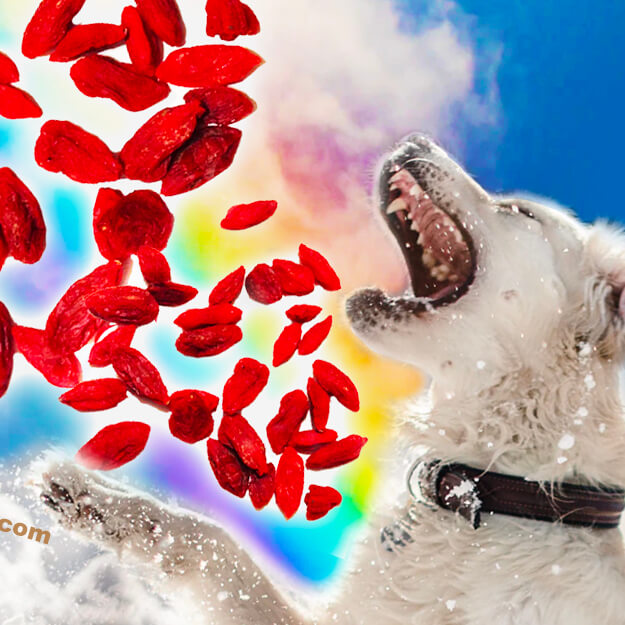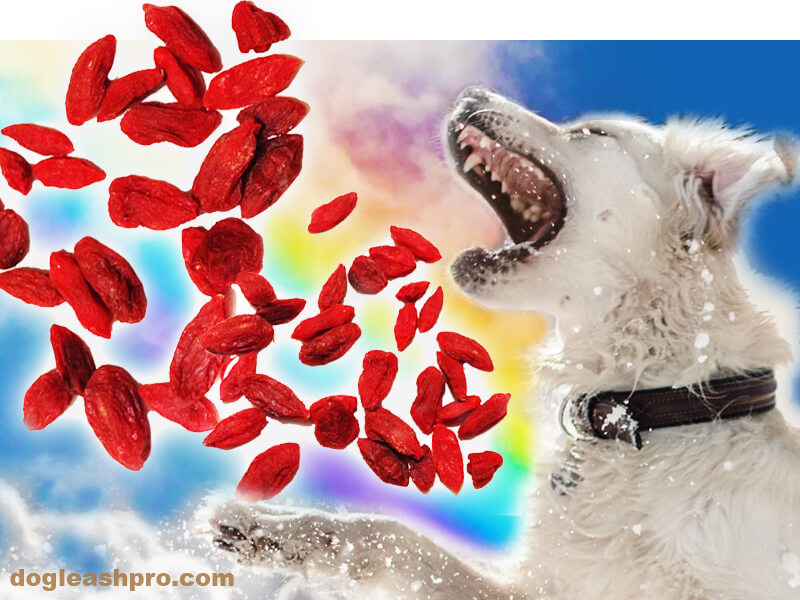
Yes, dogs can eat Goji Berries because they are rich in nutrients, but they should only be fed to dogs in moderate amounts and as an occasional treat a few times a week and not daily. It’s important to understand both the nutritional benefits of this fruit and how to properly prepare it before feeding them to your dog.
Let’s dive in and learn all about this superfood, Goji Berries. It’s natural for dogs to enjoy human foods, but not all human food is good for dogs. Luckily, much like the sweet yet tart Mulberries, Goji Berries are safe for dogs to eat.
Table of Contents
What are Goji Berries?
Goji Berries, also called wolfberries, were discovered decades ago. They originated from the Asia continent, around China, Japan, Vietnam to name but a few. Currently, the major production of the Goji Berries is in China, in a place known as Ningxia Hui.
They look like dry red raisins and are almost the same size as pumpkin seeds but thinner. The fresh ones are sweet and cherry juicy. When the juicy fluid dries up, it forms a sugary taste which makes the dried Goji Berries more delicious and best for snacking.
When can dogs have Goji Berries?
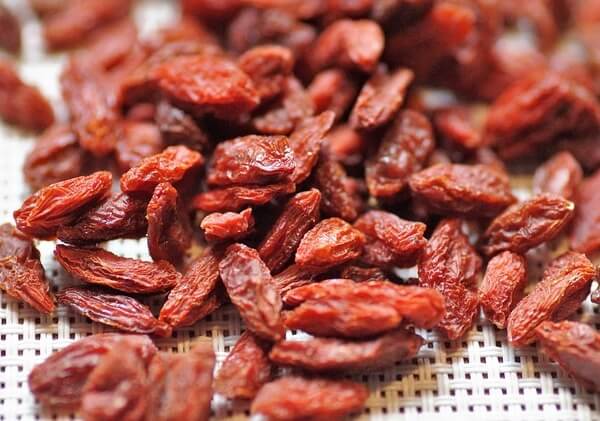
The moment your puppy starts to feed on solid foods, they are good to have Goji Berries. However, avoid feeding this to your pooch every day since they do contain sugar. Many human foods contain high sugar content, which might cause serious health issues like diabetes and dental problem in dogs. Keep in mind that dogs do not need much sugar intake.
The good news is that the Goji Berries provide numerous health benefits for your canine. So, go ahead and give your four-legged dogs three or four Goji Berries to enjoy, but do so once every few days.
Can dogs eat dried Goji Berries?
Yes, dogs can eat dried Goji Berries. Both dried and fresh Goji Berries provide the same nutritional value to a dog. So feel free to feed your dog any available Goji Berries that you may have but be mindful that it should be an occasional treat or used as a training reward once in a while.
The fresh ones are juicy, but the dried ones are more delicious. The dried ones are best preferred as a snack. They are low in calories, high in fiber, rich in amino acids, carotenoids, antioxidants, and contain protein. Plus they can be kept for a long time before consumption.
Fun Fact: Jicama is another food that is nutrition-dense which means it is low in calories and high in nutrients. Check out Can Dogs Eat Jicama? to find out if you can share some of it with your canine friends.
Are Goji Berries safe for dogs?
Yes, Goji Berries are safe for dogs and a good source of nutrients.
However, since Goji Berries do contain sugar, they are not safe for dogs with existing diabetes. It is best not to give your canine any Goji Berries if he is diabetic.
Also, you should not feed Goji Berries to your four-legged pooch every day. Doing so can easily lead to a medical emergency. Being a responsible dog owner, you’ll need to control your dog’s sugar intake level to prevent canine diabetes.
Are Goji Berries considered a superfood for your dog?
Yes, Goji Berries are considered a superfood for dogs. Nowadays, a good number of dog owners are looking forward to supplementing their dog’s diet with a superfood for nutritional reasons.
Fresh or dried Goji Berries can be used as a treat or occasional snack for dogs. They are high in fiber and proteins and low in calories. Compared to oranges, they contain a higher level of vitamin C. Goji Berries also contain a high level of supplement minerals like amino acids, iron, and zinc.
Hence, Goji Berries are the better option for an occasional dog treat rather than those processed dog treats. Since humans can eat Goji Berries, it is fun to occasionally share this snack with your fur friend. Keep in mind to feed them to your pup as an occasional treat and in moderation as they do contain sugar.
Health benefits of Goji Berries for dogs
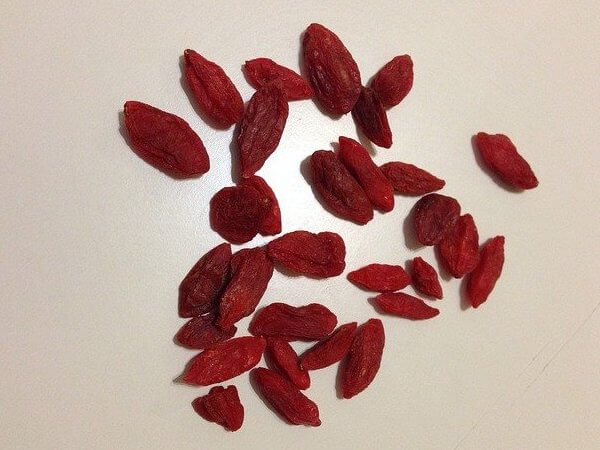
Goji Berries provide many health benefits for dogs. For example:
Immunity improvement
Immunity is the ability of the body to naturally fight bacteria-causing organisms. Goji Berries contain necessary components that will protect your dog’s body against infections causing illness.
Anti-inflammatory
There are many factors that can cause inflammation in dogs. For example, some dogs are allergic to pollen or have inflammation due to taking certain types of medication. When your pooch occasionally snacks on Goji Berries, it can help to reduce their inflammation.
Eye-sight enhancement
Snacking on Goji Berries may also help your dog’s eyesight. Like humans, eye-sight is very important to dogs. A quick fact is that they can see in the darkness.
Your canine needs a supplement that can enhance his eyesight and puts at bay any eye-causing illness. So it is a good idea to give your pup Goji Berries as an occasional treat.
Nutrient benefits of Goji Berries for dogs
Goji Berries are packed with iron, fiber, minerals, and vitamins A and C. Let’s take a closer look:
In 5 tablespoons or 28 grams of dried Goji Berries, it has the following nutritional benefits:
- Calories: 98
- Protein: 4 grams
- Fiber: 3.6 grams
- Iron: 11% of the daily value
- Vitamin A: 50% of the daily value
- Vitamin C: 15% of the daily value
- Fat: 0.1 grams
- Carbs: 21.6 grams
Here’s how iron, calcium, fiber, minerals, and vitamins helps benefit your dog’s health:
- Iron. It helps in the production of red blood cells which increases blood supply for the dog.
- Calcium. Good for bone development, it enables your dog to develop strong teeth and bones.
- Fiber. Ensures a smooth digestion process, protecting your dog from constipation.
- Vitamin C. Enhances eye-sight.
Fun Fact: Speaking of nutrient-dense food, did you know that Chickpeas are also packed full of vitamins, minerals, fiber, and protein? Check out Can Dogs Eat Chickpeas? to find out if Chickpeas are safe for doggy consumption.
How many Goji Berries can I give my dog?
The most Goji Berries to give your pup is eight. We recommend 8 Goji Berries or less a few times a week. It’s best not to feed your pooch too many Goji Berries since they have high sugar content.
The general rule of thumb is that snacks or treats should not go over 10% of your pup’s daily calories. In this case, since Goji Berries are high in sugar, Goji Berries should be far less than 10% of your pup’s daily diet.
Additionally, the amount of Goji Berries to give to your pooch depends on their weight and size.
Moderation is key
You should be mindful of how many Goji Berries you give to your dog. Given that they are a delicious snack, some dogs will want more. And you may be tempted to give him more Goji Berries than is recommended.
Try to avoid giving your furry friend too many Goji Berries. Excess consumption of Goji Berries can cause health-related complications to your adorable pooch.
How to properly prepare and feed your dog Goji Berries
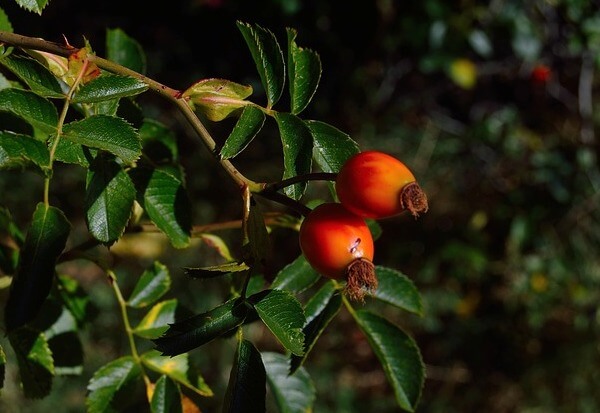
You can feed your pooch both dried and fresh Goji Berries. Here’s what you can do, but be sure to avoid regular feeding and do not feed them to dogs with diabetes.
- First, detach the Goji Berries from their stem if they are still attached.
- Allow your pooch to eat the Goji Berries one at a time, individually.
- You can feed Goji Berries from your hand or place them in a dog bowl. Enjoy!
Alternatively, if you’d like to mix fresh Goji Berries with other types of berries or fruits, you can do the following:
- Get 8 or fewer Goji Berries, blueberries, blackberries, raspberries, cherries, and apples.
- Blend the above fruits
- Add water into the blended fruits and blend again so you have a smooth solution.
- Enjoy!
Can a dog be allergic to Goji Berries?
In rare cases, yes, dogs can be allergic to Goji Berries. 99% of dog parents have reported success upon giving their pooch Goji Berries for the first time, which means their dogs didn’t have any reactions or complications.
We recommend feeding your furry companion just 1 or 2 Goji Berries if this is your first time feeding them to your pup. Immediately after, observe how he reacts and see if he is experiencing an allergic reaction. Some allergic reactions may be:
- Itchy skin
- Ear infection
- Eye irritation
If after feeding your pup 1 to 2 Goji Berries and he is fine, then it is ok to feed your pup this food going forward. Again, this should only be an occasional treat and not something you give to your pup daily.
Are Goji Berries toxic to dogs?
Yes, Goji Berries can be toxic to dogs, if given in a large amount. Dogs that consume too many Goji Berries can have the following symptoms:
- Diarrhea.
- Vomiting.
- Difficulty breathing.
It can also be dangerous if Goji Berries are mixed with any medication your dog may be taking.
What happens if your dog eats too many Goji Berries?
Too many Goji Berries can be toxic to your dog and this can cause the following:
- Diarrhea. Excess Goji Berries can mess up your dog’s digestive system.
- Obesity and diabetes. Goji Berries contain sugars if consumed in a large amount and can cause obesity which later can develop into diabetes.
Are Goji Berries a stimulant?
Yes, Goji Berries are a stimulant. They help in boosting better sleep and eyesight. Thus, it is healthy to feed your dog Goji Berries once in a while as Goji Berries are a stimulant.
Are berries poisonous to dogs?
Yes, berries can be poisonous to dogs, especially if your pup consumes them in large quantities or when mixed with medication.
For you to determine if your pooch has been poisoned by berries, be sure to check for the following symptoms:
- Vomiting.
- Diarrhea.
- Itching.
- Difficulty breathing.
If your dog happens to show any of the above signs, consult with your vet immediately.
Treatments if your dog has Goji Berries poisoning
First, it’s best to know the first-aid tips for Goji Berry poisoning. It will go a long way to saving your dog’s life before going to the vet or waiting for a vet to arrive.
Ensure your dog drinks a lot of water as soon as you notice any of the above symptoms of food poisoning. It will help to lower the toxin level in their bloodstream.
Ask your vet if you should use activated charcoal. If your vet agrees, give it to your dog so that it will help to reduce the absorption of the toxin. The vet may also use activated charcoal to accelerate vomiting and remedy the poisonous effect.
Canine-friendly alternatives to Goji Berries
As always moderation is key when feeding Goji Berries to your pup. It’s best to give them less than 8 Goji Berries, but if your pooch is giving you that puppy eyes and you give in, there are definitely canine-friendly alternatives you can give to your four-legged friend instead of more Goji Berries.
We provide our Labrador this crunchy fruit treat whenever we’re having Goji Berries:
So, can dogs eat Goji Berries?
Yes, dogs can eat Goji Berries. Go ahead and feed 8 or fewer Goji Berries to your adorable dog as an occasional treat a few times a week. Avoid feeding them to your precious pooch daily. You can also use Goji Berries as a training treat.
Related Questions
Since Goji Berries are very sweet, it’s crucial that dogs only eat eight Goji Berries or less three times a week, every few weeks. Goji Berries should not replace your dog’s regular meal, but they can be an occasional treat here and there. Avoid feeding your canine friends Goji Berries every day.
DISCLAIMER: THIS WEBSITE DOES NOT PROVIDE MEDICAL ADVICE
The information, including but not limited to, text, graphics, images and other material contained on this website are for informational purposes only. No material on this site is intended to be a substitute for professional veterinary advice, diagnosis, or treatment. Always seek the advice of your veterinarian or other qualified health care provider with any questions you may have regarding dietary needs.
Resources:
https://www.akc.org/expert-advice/health/diabetes-in-dogs/
https://en.wikipedia.org/wiki/Goji

With over five years of specialized experience as an animal writer, my expertise lies in dog nutrition, health, behavior, grooming, and training. I am dedicated to delivering helpful and informative content that caters to the well-being of our furry friends. My primary goal is to empower pet owners with knowledge and ensure our canine companions thrive in health and happiness. In my free time, I love volunteering at local dog rescue centers.
